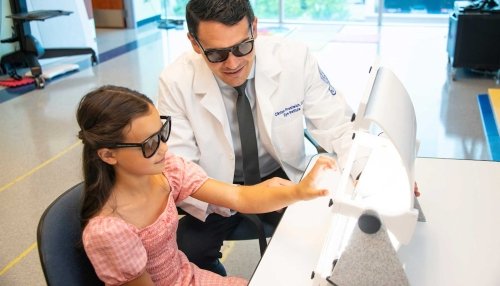Occasionally, one or more of these skills does not develop appropriately which can cause issues such as double vision, constantly skipping or re-reading lines on a page, headaches, and/or difficulty taking notes. Vision Therapy is a sequence of exercises that are a highly effective, non-surgical treatment for many common visual problems such as lazy eye, crossed eyes, double vision, and convergence insufficiency. It is also highly beneficial for patients with visual symptoms following a concussion, also known as a Traumatic Brain Injury (TBI).
Learn more about Acquired Brain Injury
How We Can Help
Our students and doctors are trained in analyzing where you or your child’s visual system may not have fully developed in addition to prescribing individualized therapy exercises to help improve those specific areas. These activities range from exercises using computer programs to incorporating the entire body on balance beams and eye-hand coordination.
What to Expect
A type of eye exam known as a Visual Efficiency Examination is required prior to beginning Vision Therapy. This examination evaluates how well your eyes work together as a team through techniques not performed in a regular eye examination. We may also recommend a Visual Information Processing examination to evaluate how your brain analyzes the information the eye is seeing. The information from these two types of exams provides the most in-depth analysis of your visual system, and helps our students and doctors to best manage your symptoms and prescribe the most appropriate therapy techniques.
Vision Therapy is performed in weekly 45 minute sessions with additional home-therapy exercises prescribed between sessions. It is common for your eyes to feel sore and tired after a session, however this will go away within a couple of hours after the session.
Contact Information
For more information about our vision therapy services, please contact 623-537-6000, option 4.

